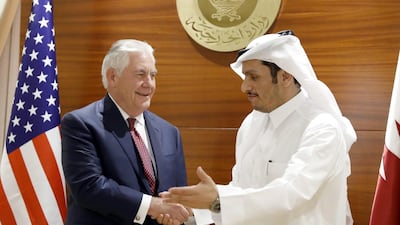On Monday, Rex Tillerson, the US secretary of state, spoke alongside his Qatari counterpart, Sheikh Mohammed bin Abdulrahman Al Thani, about the ongoing regional crisis precipitated by Doha's support for terrorism. He urged all parties to "minimise the rhetoric" and take steps to "de-escalate the tensions" and put an end to the unhealthy environment. The Gulf Cooperation Council, Mr Tillerson further said, should "continue to pursue unity" because it is "most effective when it is unified, and none of us can allow to let this dispute linger".
It is hard to fault the Mr Tillerson's prescription for a peaceful, prosperous Middle East: unity. It is precisely in pursuit of these objectives that the Arab quartet – comprising Saudi Arabia, the United Arab Emirates, Egypt and Bahrain – severed ties with Qatar in June of this year. These nations did not seek to shatter the unity of the GCC. They merely wanted "unity" to translate into purposive and mutually beneficial action. That, however, was not going to happen as long as one member of the GCC – namely, Qatar – continued to finance international terrorism, host extremists and spread instability in the region. To overlook Qatar's conduct would have been to dishonour the fraternal bonds that form the basis of Arab unity.
___________________
Read more:
Rex Tillerson warns of 'those looking to exploit Qatar crisis' to destabilise region
Go home, Tillerson tells Iran-backed militias and Iranian advisers in Iraq
GCC summit will most likely be postponed due to Qatar crisis
___________________
Nonetheless, since breaking off relations with it, the quartet has advanced multiple opportunities to Doha to mend its ways. Qatar, instead of responding constructively to these offers, retaliated with overheated rhetoric. It even doubled down on the actions that prompted the schism in the first place. Prior to arriving in Qatar, Mr Tillerson made visits to Afghanistan and Saudi Arabia. The former is besieged by the Taliban, who have enjoyed Qatar's hospitality for years now. The latter faces grave threats from Iran and its proxies. What Arab country has deepened its relations with Iran, a sworn foe of Arab states? Qatar again. Speaking in Riyadh, Mr Tillerson warned that Iranian proxies in Iraq should have to leave the country to allow its people to "regain control" of their own destiny. In Qatar, Mr Tillerson cautioned that Iran will try to exploit the crisis in the GCC. Iran's chief enabler in the region has been Qatar. This is a statement of fact.
Qatar's foreign minister expressed the desire for dialogue to commence. This is also what the quartet wants. But what is the point of a dialogue if it is to be used as a distraction from Qatar's activity? Dialogue for dialogue's sake, while Doha continues to fund terrorism, would make a mockery of the concerns of the quartet. Talks would serve a meaningful purpose only if they followed concrete actions. Doha has been given chances aplenty for action. It is time now for Qatar to discard the old ways. Because Doha's harsh rhetoric, breathless propaganda and support for terror will not break the resolve of the quartet to protect their peoples. Only concrete action by Qatar can bring this crisis to an end.
Follow The National's Opinion section on Twitter

